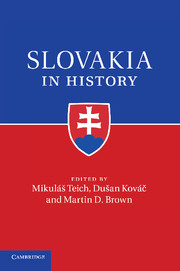Book contents
- Frontmatter
- Contents
- List of figures
- List of maps
- Notes on contributors
- Acknowledgements
- Map 1 Slovak Republic
- 1 Slovakia, the Slovaks and their history
- 2 The Duchy of Nitra
- 3 The beginnings of the nobility in Slovakia
- 4 Medieval towns
- 5 Renaissance and humanist tendencies in Slovakia
- 6 The period of religious disturbances in Slovakia
- 7 The Enlightenment and the beginnings of the modern Slovak nation
- 8 Slovak Slavism and Panslavism
- 9 The Slovak political programme: from Hungarian patriotism to the Czecho-Slovak state
- 10 Slovakia in Czechoslovakia, 1918–1938
- 11 Slovakia from the Munich Conference to the declaration of independence
- 12 The Slovak state, 1939–1945
- 13 The Slovak question and the resistance movement during the Second World War
- 14 The Slovak National Uprising: the most dramatic moment in the nation's history
- 15 The Slovak question, 1945–1948
- 16 Czechoslovakism in Slovak history
- 17 The Magyar minority in Slovakia before and after the Second World War
- 18 The establishment of totalitarianism in Slovakia after the February coup of 1948 and the culmination of mass persecution, 1948–1953
- 19 Slovakia and the attempt to reform socialism in Czechoslovakia, 1963–1969
- 20 Slovakia's position within the Czecho-Slovak federation, 1968–1970
- 21 Slovakia under communism, 1948–1989: controversial developments in the economy, society and culture
- 22 The fall of communism and the establishment of an independent Slovakia
- 23 Afterword: Slovakia in history
- Index
22 - The fall of communism and the establishment of an independent Slovakia
Published online by Cambridge University Press: 07 October 2011
- Frontmatter
- Contents
- List of figures
- List of maps
- Notes on contributors
- Acknowledgements
- Map 1 Slovak Republic
- 1 Slovakia, the Slovaks and their history
- 2 The Duchy of Nitra
- 3 The beginnings of the nobility in Slovakia
- 4 Medieval towns
- 5 Renaissance and humanist tendencies in Slovakia
- 6 The period of religious disturbances in Slovakia
- 7 The Enlightenment and the beginnings of the modern Slovak nation
- 8 Slovak Slavism and Panslavism
- 9 The Slovak political programme: from Hungarian patriotism to the Czecho-Slovak state
- 10 Slovakia in Czechoslovakia, 1918–1938
- 11 Slovakia from the Munich Conference to the declaration of independence
- 12 The Slovak state, 1939–1945
- 13 The Slovak question and the resistance movement during the Second World War
- 14 The Slovak National Uprising: the most dramatic moment in the nation's history
- 15 The Slovak question, 1945–1948
- 16 Czechoslovakism in Slovak history
- 17 The Magyar minority in Slovakia before and after the Second World War
- 18 The establishment of totalitarianism in Slovakia after the February coup of 1948 and the culmination of mass persecution, 1948–1953
- 19 Slovakia and the attempt to reform socialism in Czechoslovakia, 1963–1969
- 20 Slovakia's position within the Czecho-Slovak federation, 1968–1970
- 21 Slovakia under communism, 1948–1989: controversial developments in the economy, society and culture
- 22 The fall of communism and the establishment of an independent Slovakia
- 23 Afterword: Slovakia in history
- Index
Summary
The entry of five Warsaw Pact armies on to Czechoslovak soil in August 1968 prevented the continuation of the country's social reforms. After the intervention the Soviet leadership, in co-operation with other Warsaw Pact leaders, continued to pressure the leadership of the Communist Party of Czechoslovakia (CPC), the government and the parliament to prevent further reforms. These pressures led to the Moscow Protocol, which defined Czechoslovakia's new limited sovereignty. The Agreement on the Stationing of Soviet Forces, which gave no date for their departure, legitimised their presence on the territory of Czechoslovakia until the eventual collapse of the Communist regime. The leaders of the Warsaw Pact, with the support of conservative and pro-occupation forces, then planned to expel the representatives of reformist communism from leading positions in the CPC, government and parliament.
The era of ‘normalisation’
By the autumn of 1968, the campaign led by domestic conservative Communists was primarily directed at Josef Smrkovský, who was the chairman of parliament. As a result of Soviet pressure the leadership of the CPC did not repropose Smrkovský for the post at the end of 1968. The campaign unleashed to discredit Smrkovský was, at the same time, discrediting reformist communism in general. The second victim of Soviet pressure was Alexander Dubček, who was forced to resign as first secretary of the Central Committee of the CPC in mid April 1969.
With Gustáv Husák's assumption of the top position in the Communist Party, the era of ‘normalisation’ got underway.
- Type
- Chapter
- Information
- Slovakia in History , pp. 351 - 369Publisher: Cambridge University PressPrint publication year: 2011
- 2
- Cited by

